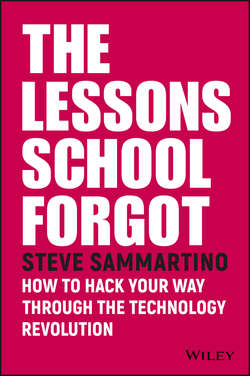The Lessons School Forgot

Реклама. ООО «ЛитРес», ИНН: 7719571260.
Оглавление
Steve Sammartino. The Lessons School Forgot
About the author
Preface
Part I. Revolution
Chapter 1. A lesson about school
STEM is not enough
Time to unlearn
The history of the present
Why change hurts
Incentives shape behaviour
Hack the system!
Chapter 2. A proxy for happiness
The education tightrope
The paperwork
Formal now or formal later?
Pull up your roots
Chapter 3. The future is informal
Discover the entrepreneur within
Self-reliance needs a comeback
The pace of change is super-radical
It's time to just make stuff up again
The formal institutions really don't get it
Definitions really matter
My school report
Chapter 4. The future of work
Your job is already gone
An independent future
The labour escalator
The hierarchy of human needs revisited
Ignore your weaknesses
Strength-finding hacks
Economics is always major
Part II. Revenue
Chapter 5. The truth about money
Are you being or organising?
Why ESTEEM matters
Divide and conquer, economics style
Learning to do both
The jobs and growth hoax
Chapter 6. Money isn't money
Delivering against a future promise
The three types of money
From ownership to access
Wages, profits and tax
Chapter 7. The seeds of greatness
Spent money vs invested money
Where did it go? The necessities confusion
Society says spend
Finance is a game
The three places money can be stored
Where to allocate our dollars
The 30 per cent split
It's bigger than you
Chapter 8. The future of money
The company isn't real
The ‘turnaround' hoax
The future value equation
Unions – the false friend
Chapter 9. The best way to invest money
Time and money – the two investments we make
The basics are beautiful
The main challenges to investing
Mistaking gambling for investing
The success bias
What makes investments go up in value
Financial independence
The financial wealth success ratio
How to build passive income
Capital always wins
Part III. Reinvention
Chapter 10. Portfolio living
How to become … anything
The 10-meeting method
Prove it!
The most valuable thing I've ever done
The portfolio of you
You are an entrepreneur – right now
Venn living
Speed, momentum and success
The feedback loop
Chapter 11. Freelancing is rad
A win–win solution
You're worth more than you think – freelance pricing
Portfolio theory and the projecteers
The greatest freelance hack of all time
Chapter 12. Upskilling
Make the market (people) love you
Become a one percenter
Find human filters
The impact of technology, not how it works
The no-excuse list – how to learn anything for free and change your life
Privileged Johnny vs Hardworking Mary
The ultimate pitch method – how to sell anything to anyone
Chapter 13. Instant startup entrepreneur
All or nothing is terrible advice
Side projects and the MVP
Become an entrepreneur – today
Your personal brand
Chapter 14. DNA is DESTINY
en•tre•pre•neur
What to teach your kids
Philosophy is greater than tactics
The truth about wealth
Notes
Index
WILEY END USER LICENSE AGREEMENT
Отрывок из книги
Steve wrote his first lines of computer code at age 10, and is one of Australia's most respected business minds. While the school system didn't really suit his learning style, he has an incredible ability to make sense of how emerging technology is changing the way we work, live and earn. He's a born entrepreneur, and had his first startup at age 10 – an organic egg farm. While holding down a daytime corporate gig, in his spare time he started and eventually sold a successful a clothing business. (He used to start work at 5 am, sell to customers at lunch time and do the administration at night.)
After graduating from university majoring in Economics, he worked in multiple Fortune 500 companies and held many senior positions culminating in directorships, before answering his true calling for independence from The System. Curious about why some people seemed to get richer, regardless of education and income, he delved deeply into the study of personal finance, informally. His experience means he intimately understands small and big business and how to play the game to get ahead and design your own future.
.....
They designed it for them. You might be wondering who ‘they' actually are. Well, ‘they', in the developed world at least, are the governments and the industrialists and business leaders who own and control the factors of production. School as we know it was designed to create competent, compliant workers who could fit into the rapidly industrialising world.
Before the industrial revolution there was a very high probability that people would simply do what their parents did, especially if it involved agriculture or a craft. They would follow family tradition, the required skills usually handed down from parents or close relatives. Or they'd work in the family business, most often eking out a living with the primary focus of providing for the food, clothing and lodging to sustain their family. There wasn't much excess for the working classes, but there was a fair amount of freedom.
.....